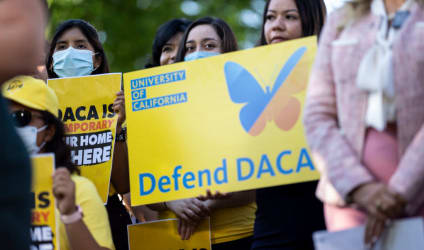DACA College Students Face Uncertainty
Writer
Writer
www.bestcolleges.com is an advertising-supported site. Featured or trusted partner programs and all school search, finder, or match results are for schools that compensate us. This compensation does not influence our school rankings, resource guides, or other editorially-independent information published on this site.
Turn Your Dreams Into Reality
Take our quiz and we'll do the homework for you! Compare your school matches and apply to your top choice today.
- Texas judge sides with nine conservative states that challenged the legality of DACA.
- Over 200,000 U.S. college students were eligible for the Obama-era program.
- The ruling does not impact current DACA recipients, but leaves hopefuls in limbo.
A federal judge ordered the Department of Homeland Security to stop all approvals for the Deferred Action for Childhood Arrivals (DACA) program. The immigration policy currently permits around 650,000 young people (also known as "Dreamers") who were brought illegally into the country as children to remain in the U.S., rather than be deported to their countries of birth.
The program provides two years' reprieve from deportation (with the opportunity of renewal), a right to work, and eligibility for driver's licences and some student financial aid. It also allows unauthorized immigrant students to qualify for in-state tuition.
Judge Andrew Hanen of the U.S. District Court for Southern Texas left DACA intact for existing recipients, and allowed DACA renewals to continue. However, the federal government is prohibited from granting first-time DACA applications, leaving thousands of students in limbo.
An estimated 300,000 people became eligible to apply for DACA in December, many of whom are current or prospective college students. Those eligible for DACA, whether or not they've applied to the program, make up nearly half of the 450,000 undocumented students enrolled in U.S. colleges.
Texas Judge Shuts Door on DACA
A lawsuit filed by the states of Texas, Alabama, Arkansas, Kansas, Louisiana, Mississippi, Nebraska, South Carolina, and West Virginia challenged the legality of DACA, created by former President Barack Obama in 2012 through an executive order.
The lawsuit cited the strain the program places on public resources, including education. The coalition of conservative states also argue that Obama didn't have the authority to create DACA, that the order circumvented Congress, and that it failed to pass through a period of public comment.
The decision to halt new DACA approvals sends the case back to the Supreme Court. Last June, the Supreme Court ruled that former President Donald Trump could not end DACA without following procedural requirements that include providing "a reasoned explanation."
The Texas ruling has galvanized immigration activists who demand that Congress create a legal pathway to citizenship for undocumented immigrants. President Joe Biden and Vice President Kamala Harris announced their administration's intent to preserve and strengthen DACA, but also say a permanent solution requires Congress.
In the meantime, the Department of Justice will appeal the judge's order and the Department of Homeland Security plans to issue further regulation concerning DACA. Secretary of Homeland Security Alejandro Mayorkas said he was "disappointed" with the ruling but affirmed the Biden administration's commitment "to ensuring that Dreamers are protected from the threat of deportation."
More than 500 college presidents and chancellors have signed a petition from the Presidents' Alliance on Higher Education and Immigration signaling their support for immigration policy reform and their commitment to helping undocumented students.
What Should DACA Recipients Do?
While the court's order does not impact current DACA recipients, it does place new pressure on recipients to keep their work permits current. In order to be eligible for renewal, the current DACA permit must be unexpired. DACA recipients should start the renewal process 150 days (five months) before the expiration date.
For prospective DACA enrollees, the waiting game continues. It's still possible to submit applications to the Department of Homeland Security, though the agency cannot process them. First-time applicants in the process of applying for DACA are advised to seek out legal help. Current and prospective college students should also reach out to their schools.
Editor's Note: This article contains general information and is not intended to be a substitute for professional advice. Please consult a professional advisor before making decisions about legal issues.
Feature Image: ftwitty / E+ / Getty Images





